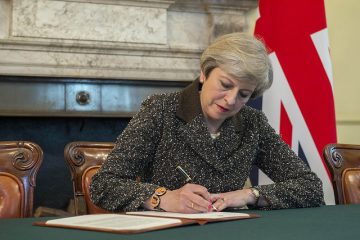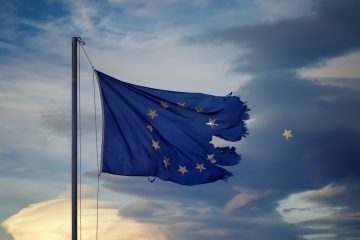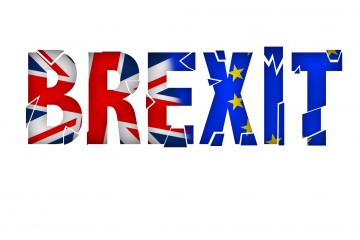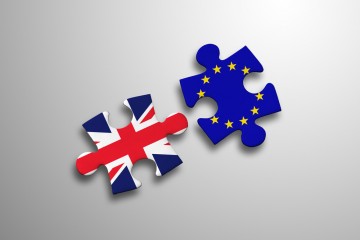
Why a larger Conservative majority in Westminster may lead to a weaker bargaining position in Brussels
It is predicted that Prime Minister Theresa May’s Conservative Party will achieve a significant victory in the upcoming general election on June 8. If the predictions are correct — though at the time of writing Labour is advancing in the polls — May will find herself in a more comfortable position domestically, governing with a larger majority. On the international stage, however, will this increase in domestic power lead to an advantage for the United Kingdom at the negotiation table in Brussels? The Brussels-based press seems to think so, writing that “victory will allow May to head into EU-UK Brexit negotiations with a strengthened hand at home” and “if the U.K. holds a general election in June, Brussels can only lose.” May …

Europe is no longer safe
The pillars of Europe’s security are damaged beyond repair and Europe’s leaders are in denial. Expect very heavy turbulence starting next year. The peaceful post-1989 order on the old continent rested on three key pillars: NATO, the EU, and the ruling mosaic of centre-left-and-right parties. NATO provided the hardware, the EU delivered the soft-ware, and the ruling parties offered legitimacy. All these three pillars are now damaged beyond repair. Donald Trump’s victory has buried NATO. Collective defence and deterrence can only work if they are not subject to speculation. Trump has made it clear that he wants to keep his options open. The everything-goes policy is a recipe for anarchy, not security. I am not even talking about Trump’s links with …

What Iceland’s election means for its relationship with the EU
This week the Icelandic public elected a new parliament. The Independence Party was the clear winner with 29 per cent of the vote, up from the last elections 26.7 per cent. This is a good result for them, boosting their numbers by two more seats to twenty-one. At this table shows, by contrast, it was the Progressive Party, their coalition partner, who bore the brunt of the backlash, despite Iceland’s economic recovery in the last three years. Last April, news surfaced that Sigmundur David Gunnlaugsson, the then prime minister, and his wife owned Wintris, an off-shore company that held debt from failed Icelandic banks – a fact he failed to disclose upon entering parliament in 2009. This caused widespread public …

The 1975 Referendum on Europe
The United Kingdom joined the European Economic Community (as it then was) on 1 January 1973 after negotiations by the Conservative government led by Edward Heath. In the run up to the subsequent 1974 General Election the Labour Party pledged, in its manifesto, the United Kingdom’s first nationwide referendum on whether to stay part of the Economic Community on renegotiated terms or to completely part company. With a Labour victory, the new Prime Minister, Harold Wilson, followed through on his promise and a referendum was held on 5 Jun 1975. The outcome was an overwhelming victory (67%) for the ‘In’ campaign. The 1975 vote in favour of Europe did not, however, end the debate on the United Kingdom’s membership of what …

Brexit Buyers’ Remorse? Non, on ne bregrette rien
The vote to leave the EU was an outcome which surprised most commentators, bookies, and even those who voted for the winning side. In the aftermath of the result, John Gray, a popular political theorist, wrote that ‘voters inflicted the biggest shock on the establishment since Churchill was ousted in 1945’. It is hard to think that he is wrong. The only social classes which predominately voted Remain were ABs (affluent and middle-class voters), whereas C1 C2 DE (lower middle-class and working-class) voters all delivered majorities for Leave. As I predicted on this blog in January and contrary to many commentators’ expectations, the referendum engaged more voters than recent general elections. It generated the highest turnout in a UK election …

Brexit and the Radical Tory Tradition of British Socialism
In the spasms of defeat following the EU referendum, some Remain commentators have suggested that Brexit was a fundamentally racist choice. Indeed, one of the most forceful was Richard Elliot’s assertion on this blog that Brexit supporters are ‘the Cecil Rhodes of the twenty-first century’. Elliot’s article reflects the stifling academic consensus which cannot even comprehend how ‘good people’ could vote to Leave. This breathtakingly simplistic analysis amounts to little more than the assertion that clever, open-minded people voted to Remain whereas stupid, backward people voted to Leave. It echoes the debate over joining the Euro fifteen years ago when, as Larry Elliot reflected, ‘People who liked the Euro were civilised, supported the arts, went to Tuscany or the Dordogne …

Brexit and the Anti-Elite Era
The result of the UK referendum on EU membership was an act of rejection of elite opinion. Almost the entirety of the country’s intellectual, economic and political establishment had explicitly opposed Brexit. There had been letters by Nobel laureates detailing the cost to UK research of a ‘Leave’ vote, a public statement by over 250 academics to the same affect, the official opposition of most British businesses as well as an avalanche of expert reports indicating the significant economic cost of leaving the world’s largest single market. In political terms, the ‘Remain’ campaign had the formal support of the country’s four largest political parties, the Tory-led national government and that of a plethora of international leaders, including the President of the …

What explains Euroscepticism in the Conservative Party?
Many believe that the EU referendum has been called only to enable David Cameron to appease the Eurosceptics within his own party. This is debatable on numerous grounds. But what is certain is the eventuality that many Conservatives, including possibly some Cabinet ministers, will be joining the campaigns to get Britain out of the EU. For over a quarter of a century the issue of Britain’s role in Europe has been one of the most significant divisions within the Parliamentary Conservative Party (PCP). The European issue has been a reliable source of problems for the party leadership over the years. It has led to many rebellions, numerous defections, the downfall of Thatcher, and partly accounts for the Conservatives’ landslide defeat …









